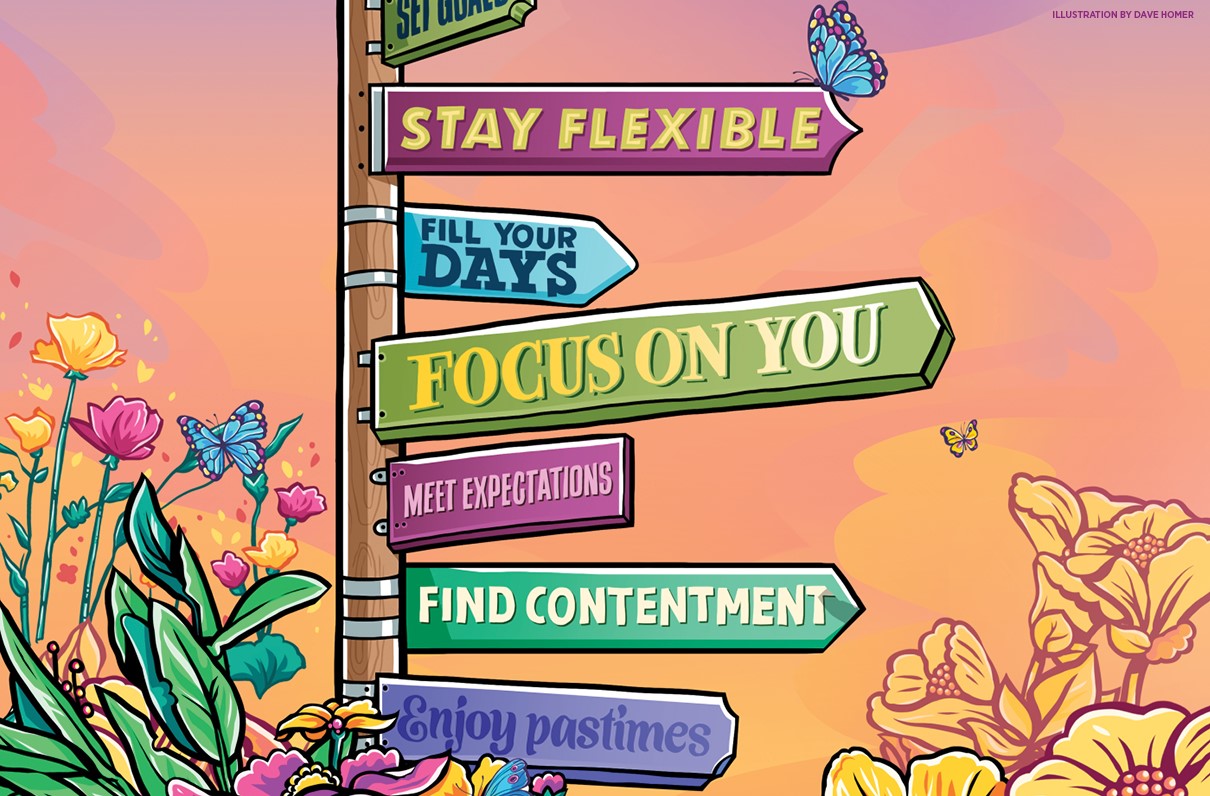(This article by K.B. Slutzky originally appeared in the September 2023 issue of Military Officer, a magazine available to all MOAA Premium and Life members. Learn more about the magazine here; learn more about joining MOAA here.)
Most of us think about retirement. We dream about the day when we will be free to spend our time doing exactly what we want to do.
Some focus a great deal of time and effort — rightfully so — on getting expert advice about how to put themselves in a financial position where the retirement of their dreams can become a reality. And while that is a vital component of retirement planning, it is not the only consideration.
Planning for how to use that free time is also important. Many make erroneous assumptions about how they will spend their retirement days, such as: “I am going to lose some weight, spend more time traveling, get to know my grandchildren, and play lots of tennis.”
According to a survey of retirees by the Nationwide Retirement Institute, 28% say life in retirement is worse, 38% say it is the same, and only 35% say it is better. Additionally, 33% of retirees do a “reverse retirement,” returning to work either full or part time. These figures are similar for all income levels.
Consider moving into retirement as you would consider taking on a new career position. You will face many changes, and you should give those changes careful consideration and develop a plan to manage them.
[RELATED: MOAA's Digital Retirement Guide]
Follow these steps:
1. Determine Your Retirement Objective or Goal
This cannot be as simple as “stop working,” “travel more,” or “play more golf.” Rather, determine a broad retirement objective such as: “I want to be able to do the things I want to do and not have to do the things I do not want to do.”
Being physically and financially able to do what you want to do is a no-brainer. Not having to do what you do not want to do adds a new dimension to your objective.
Keep in mind, an objective without an effective plan is unlikely to be reached, so the next steps are crucial to achieving your retirement goal.
[RELATED: Financial Resources From MOAA]
2. Analyze Yourself and Your Current Position
Remember, you are not considering your financial position and objectives. That is an area that should be dealt with separately but will play a major part in your “position” analysis and the specifics on how you will spend your time after retirement.
To analyze your current position, consider what you are able to do, what you are passionate about doing, and what you do not want to do. As you think about the mental and physical aspects of what you are able to do, also consider any limitations due to family obligations you might have.
Retirement is mostly about you. Others might participate in the planning, and their input must be carefully considered, but only you can envision the retirement you want and can realistically attain. Sadly, you must also consider that if your retirement plan is constructed with loved ones playing a significant role, changes in their lives could affect your plan. What if you relocate to be close to your children and grandchildren, but then your children move or their marriage disintegrates, leaving you with a life you had not anticipated? Plan for such contingencies.
[MORE FROM MOAA: Retirement Resources]
Also, when planning to spend more time with grandchildren, be sure to get your child’s thoughts. Their opinions on the matter might differ from your own.
3. Decide Who You Are
Are you an introvert or an extrovert? Do you need to be in control, or are you content to follow the lead of others? What brings you joy and contentment? How long has it been since you participated in some of the activities that you are planning your retirement around? Have you been sprinting toward your retirement, and how easy will it be for you to adjust to the slower pace you envision? Do you have a hobby or activity that you are so passionate about that it could replace your job? Could you be burned out from years of working? The reasons for some of these questions are apparent while others need an explanation.
Introverts will generally find it easier to retire than extroverts, because introverts typically can get joy and fulfillment doing activities on their own: reading, playing chess against a computer, writing, working in the yard, etc. Extroverts often need to spend time with others to enjoy themselves, and connecting with others, especially if the plan includes relocation, can be difficult.
If you have been the boss for a long time, the adjustment to not being in control can be a challenge for some. In many respects, you will be the new kid on the block. Those who have been on that block for a long time might not want to move over and let you take control. Your spouse could be one who resists giving up their domain now that you are home more often.
[RELATED: Report: Military Community at Higher Risk of Payment App Scams]
Burnout from your job could have you at the point that retirement looks like a good option. If there is a chance this is the case, you might be better off by taking a sabbatical or reducing your current working hours before jumping into retirement. Another option might be to change jobs.
4. Determine How Many Hours a Week Your Current Job Consumes
This is critical because it becomes the hours you will have to spend each week staying enjoyably occupied. Too many retirees underestimate the hours involved with their jobs each week and grossly overestimate the hours they can spend on activities such as golf or gardening. This can lead to hours of inactive time like watching TV or staying home, passive activities that, according to SeniorLiving.org, generated the lowest amount of happiness in a retirement study.
It is easy to assume you worked for 40 hours a week. But you might have spent 60 to 100 hours a week on work-related tasks. Factor in commuting, meals with customers and co-workers, and reading to stay up to date in your field and you come close to 60 hours. If you traveled frequently, you could hit that 100-hour mark. These are hours you will have to replace in your new position as a retiree.
5. Create a List of Activities
Golf is a popular pastime for many retirees. If you allow five hours a day for golf and play seven days a week, you are busy for 35 hours a week. You need other activities and hobbies to keep you busy for the other 25 to 65 hours.
[RELATED: MOAA Vacations]
Come up with a list of a minimum of six activities. They should be a mix of pastimes that are mainly mental or physical. Then estimate the amount of time that can be spent enjoyably on each, and compare the total with the work hours being replaced. Consider the following:
Mental activities:
- Reading, 14 hours
- Playing chess, seven hours
- Writing, 15 hours
Physical activities:
- Playing tennis, 12 hours
- Gardening, 15 hours
- Doing yoga, five hours
Total: 68 hours
With this plan, a retiree can replace 68 hours of work with fun, fulfilling activities.
“Self-imposed structure” through planned pastimes can help “smooth the journey” of retirement, according to Fritz Gilbert, author of The Retirement Manifesto blog. “After years of having structure imposed on our lives,” he writes, “it takes some adjustment to live a life with less structure.”
It is not easy to retire successfully. You need to know yourself and produce a comprehensive plan — one that is flexible and has as few assumptions as possible. Consider moving into retirement in stages. Give yourself time to adjust to a slower pace and to evaluate your assumptions about how you will spend your time and how it will affect your family and friends.
Remember, too, that just because you can retire does not mean you should. You might be able to do more of what you like and less of what you do not like by continuing to work. The more you put into planning your retirement, the better the chances are that the “position” of retiree will be exactly right for you.
K.B. Slutzky is a former Army captain, MOAA member, and writer based in Georgia.
 Check Out MOAA’s Digital Retirement Guide
Check Out MOAA’s Digital Retirement Guide
Your retirement, your way, with help from a trusted source -- MOAA's Digital Retirement Guide brings you information on retirement living nationwide, including easy-to-search entries and retirement news you can use.




